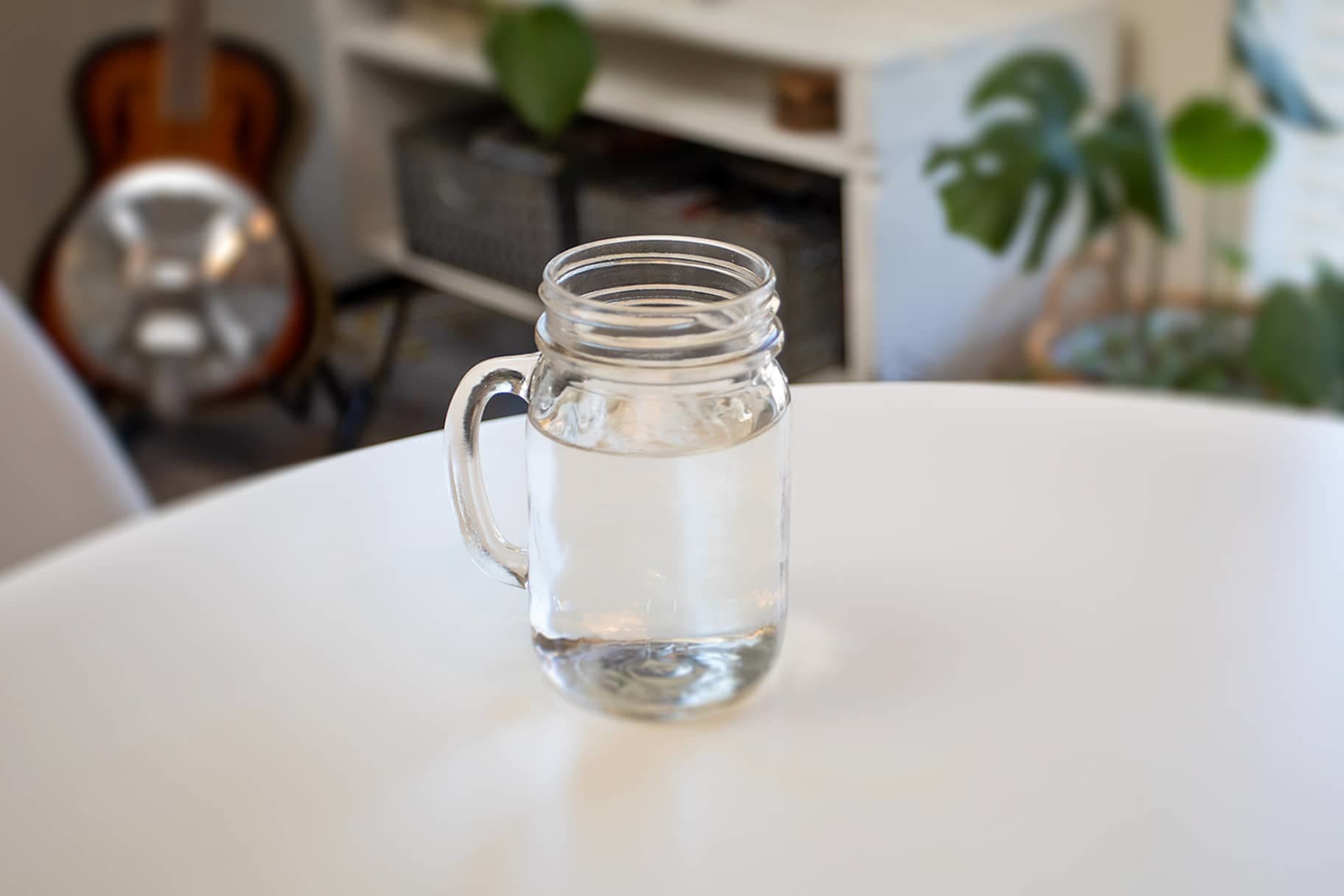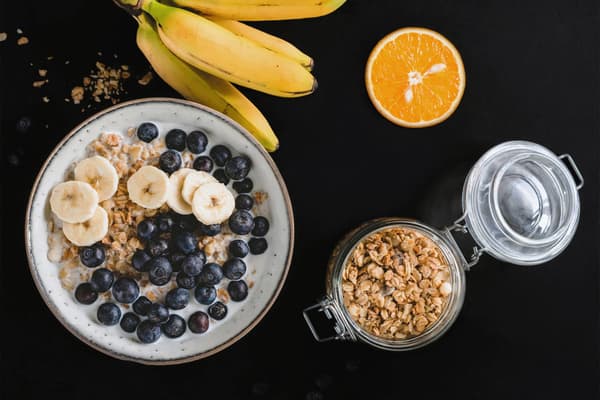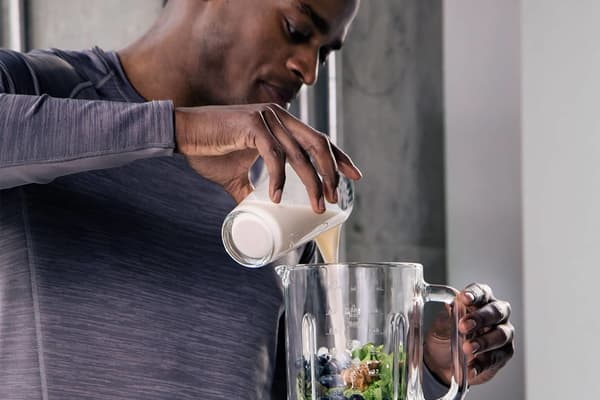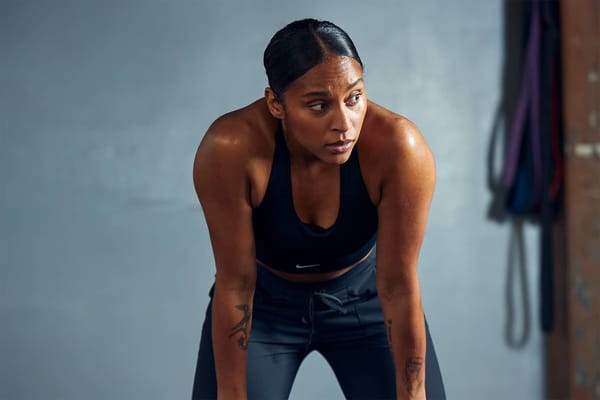This Is Exactly How Much Water You Should Drink Every Day, According to Experts
Nutrition
Is it really true you need to be sipping eight cups a day?

Whoever you are, one thing is true: over half your body is water. According to the US Geological Survey's Water Science School (USGS), up to 60 percent of the human body is water—some of your vital organs are practically oceanic. With that, it's key to consistently replenish that water. But what for? And how much water should you actually drink daily?
To maintain function throughout the body, from skin to muscles to mind, you need to consume a certain amount of water every day. This provides a stunning range of benefits, including:
· Improves digestion
· Regulates body temperature
· Allows the brain to produce key hormones and neurotransmitters
· Acts as a shock absorber for the brain and spinal cord
· Allows cells to grow and reproduce
· Helps deliver oxygen throughout the body
For athletes, numerous items on that list are tied to better performance. For example, body temperature regulation keeps you from overheating during exercise by sweating. That shock absorber effect ensures your brain and spine are protected during even an intensive HIIT session. And water transports nutrients to your muscles' cells while removing waste to provide efficiency that translates into strength gains.
The key is to consume enough water each day in the form of food, beverages and plain water to get all of these advantages. Let's dig into the specifics.
How Much Water Do I Need to Drink Daily?
Although there are some factors that increase your hydration needs—more on those next—if you're just doing everyday activities, the recommendation is about 11.5 cups of water daily for women and about 15.5 cups for men, according to Kelsey Sackmann, R.D., of Kelsey and Cooper's Kitchen in New Jersey, US.
"It's very important to drink consistently throughout the day", she says, which means that trying to fit all of your hydration into one or two guzzling sessions will probably backfire. Getting too much water—a condition called hyponatraemia, when the sodium in your body is too diluted—isn't common, but there is an increased risk if you chug a gallon at a time. Also, your body can only absorb so much at once, so you might be throwing off your electrolyte balance for nothing.
A better strategy, says Sackmann, is to hydrate first thing in the morning, with and between meals, and especially if you feel thirsty.
When Should I Hydrate?
There are times when hydration is obvious, like when you're thirsty or during any of the times that Sackmann recommends above. But what about other hydration needs? Consider modifying your total fluid intake based on these four factors:
1.Exercise
If you do any activity that makes you sweat, you need to drink extra water to cover the fluid loss. It's important to drink water before, during and after a workout, Sackmann says. If exercise is intense and lasts more than an hour, a sports drink can replace electrolytes lost through sweat.
If you experience any thirst, it might be a sign that you're already dehydrated, which can contribute to side effects like fatigue and headaches. To remain hydrated throughout a workout, the recommendation from Sackmann is to consume about 350 to 470 millilitres of water two hours before exercise, then 150 to 300 millilitres every 15–20 minutes while you work out to replace sweat losses.
2.Environment
Hot or humid weather can make you sweat more, and accordingly requires additional fluid intake. Also, bear in mind that dehydration is more likely to occur at high altitudes, so you should plan on more hydration during those training sessions. Winter is another potential dehydration risk, Sackmann adds, especially since you tend to sweat less in the cold, and may also not feel perspiration due to sweat-wicking clothes.
3.Overall health
Your body loses fluids when you have a fever, vomiting or diarrhoea. Drink more water or follow a doctor's recommendation to drink oral rehydration solutions.
Pregnancy or breastfeeding. People who are pregnant or breastfeeding need additional fluids to stay hydrated. The US Office on Women's Health (OWH) recommends that pregnant people drink about 10 cups of fluids daily, and people who are breastfeeding consume about 13 cups of fluids a day.
4.Other important signs
According to the Mayo Clinic, dehydration can occur at any age and even minor illnesses can increase your risk—it's important to understand early signs to boost your hydration. The good news: mild to moderate dehydration can usually be reversed by drinking more fluids. Look for these dehydration signs:
· Dark yellow urine
· Fatigue
· Less frequent urination
· Dizziness
· Extreme thirst
Dehydration activates both hunger and thirst centres in the brain, according to nutrition and health coach Joan Kent, Ph.D., at Food Addiction Solutions. What's one of the sneakiest dehydration signs? Intense sugar cravings, she says.
This can be particularly true after a workout, since some of your glycogen (carbohydrates that are stored in the body for energy) may have been depleted, using some of the carbohydrates stored in your muscles. When that happens, you tend to crave quick-fix carbs or other sugary foods, Kent says. When dehydration is in the mix, it can make those cravings stronger.
If you have more severe dehydration signs such as confusion, darker urine, bloody or black stools, or diarrhoea for 24 hours or more, be sure to get checked by a health professional as soon as you can.
How to Hydrate, Apart from Drinking Water
Plain water will always be the go-to when it comes to hydration, but while it's a default, that doesn't mean it's your only option. In fact, there are several choices that can help in the effort:
· Herbal tea
· Zero-sugar sports drinks
· Plant-based milk
· Dairy milk
· Fruit
· Vegetables
There's been some debate over whether coffee and other caffeinated beverages count towards your hydration goals, since they've been put under the dehydration column for years. But it turns out that may be misguided. A 2014 study in the journal PLoS One found no evidence of dehydration with moderate daily coffee intake, even with regular exercise, and that it may even have similar hydrating qualities to water.
With alcohol, however, there's no debate. Research suggests alcohol increases risk of dehydration because it's a diuretic, which means you have greater urine output that is difficult to replenish while you're having cocktails. That means if you're planning on having a drink or two in the evening, be sure to boost your hydration beforehand, sip on water between drinks and replenish the next day, Sackmann suggests.
RELATED: How to Clean a Water Bottle
Apart from alcohol, fluids from food and non-water beverage sources represent about 20 percent of your hydration needs. Sackmann says the best sources to replace electrolytes and hydrate naturally are bananas, potatoes, watermelon, spinach, blueberries, broccoli and grapefruit.
Another good choice for athletes is chocolate milk, she adds, especially after a workout. A 2018 meta-analysis in the European Journal of Clinical Nutrition found that the beverage provided similar or superior results compared with other recovery drinks.
The Bottom Line
Hydration doesn't need to feel like doing algebra. Sackmann suggests just being more aware of getting water and replenishing foods throughout the day, and to increase that effort based on how much you exercise.
For more expert-backed nutrition advice, be sure to download the Nike Training Club App!





